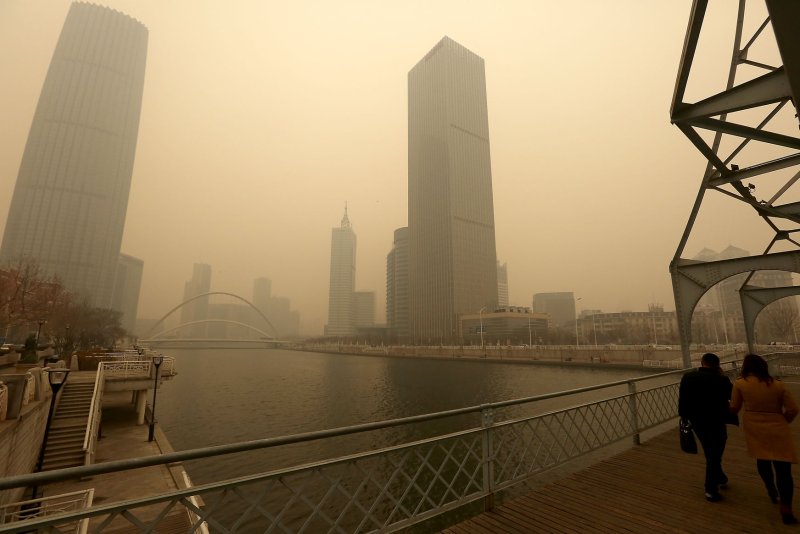A heavy, hazardous smog hangs over downtown Tianjin, a port city just east of Beijing, on February 20, 2017. File Photo by Stephen Shaver/UPI |
License Photo
Aug. 22 (UPI) -- For the first time, scientists have analyzed the effects of air pollution on life expectancy across Earth's entire human population. The new research suggests particulate emissions shorten human lives by more than a year.
Researchers at the University of Texas looked at PM2.5 pollution across the globe. Particulate matter measuring less than 2.5 microns across can be inhaled deep into the lungs. The pollution has been linked with a variety of human ailments, including lung disease, heart disease, stroke and cancer.
Factory smoke, car exhaust, fires and more contribute to PM2.5 pollution. Researchers looked at PM2.5 exposure in 185 countries. By measuring the link between particulate emissions and life expectancy in each country, researchers were able to estimate the effect of air pollution on global life expectancy.
Air pollution's downward effect on life expectancy is most pronounced in Africa and Asia. Photo by Cockrell School of Engineering/University of Texas at Austin
"The fact that fine particle air pollution is a major global killer is already well known," Joshua Apte, an assistant professor at Texas' Cockrell School of Engineering, said in a news release. "And we all care about how long we live. Here, we were able to systematically identify how air pollution also substantially shortens lives around the world. What we found is that air pollution has a very large effect on survival -- on average about a year globally."
Apte and his colleagues published their findings this week in the journal Environmental Science and Technology Letters. The research showcases the opportunity politicians, policy makers and environmental regulators have to dramatically improve human health. The benefits of cleaner air are unmistakable.
"For example, it's considerably larger than the benefit in survival we might see if we found cures for both lung and breast cancer combined," Apte said. "In countries like India and China, the benefit for elderly people of improving air quality would be especially large. For much of Asia, if air pollution were removed as a risk for death, 60-year-olds would have a 15 percent to 20 percent higher chance of living to age 85 or older."
Researchers hope their analysis makes the negative effects of air pollution more relatable than traditional death toll statistics.
Previous studies have shown the impact of air pollution on climate and human health can vary from region to region, and that climate scientists and policy makers should account for this variability. Research has also confirmed that environmental regulations can significantly reduce air pollution, improving human health outcomes.
















